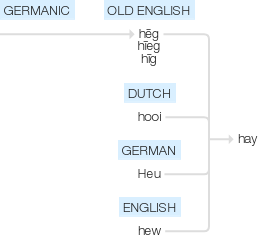Hay
Old English hēg, hīeg, hīg, of Germanic origin; related to Dutch hooi and German Heu, also to hew.
wiktionary
From Middle English hey, from Old English hīeġ, from Proto-West Germanic *hawi, from Proto-Germanic *hawją (compare West Frisian hea, Dutch hooi, German Heu, Norwegian høy), from *hawwaną(“to hew, cut down”). More at hew.
From Middle English haye, heye, a conflation of Old English heġe(“hedge, fence”) and Old English ġehæġ(“an enclosed piece of land”).
From the sound it represents, by analogy with other letters such as kay and gay. The expected form in English if the h had survived in the Latin name of the letter "h", hā.
etymonline
hay (n.)
"grass mown," Old English heg (Anglian), hieg, hig (West Saxon) "grass cut or mown for fodder," from Proto-Germanic *haujam (source also of Old Norse hey, Old Frisian ha, Middle Dutch hoy, German Heu, Gothic hawi "hay"), literally "that which is cut," or "that which can be mowed" (from PIE *kau- "to hew, strike;" source also of Old English heawan "to cut;" see hew).
Slang phrase hit the hay (pre-1880) was originally "to sleep in a barn;" hay in the general figurative sense of "bedding" is from 1903; roll in the hay (n.) is from 1941.
